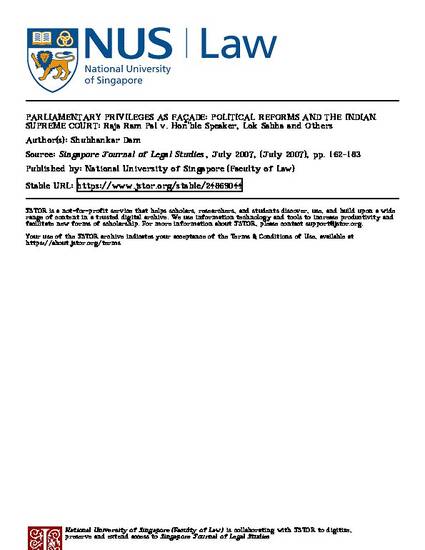
Article
Parliamentary Privileges as Façade: Political Reforms and Constitutional Adjudication
Singapore Journal of Legal Studies
(2007)
Abstract
Does the Indian Parliament have the power to expel its members under the "powers, privileges and immunities" guaranteed by the Constitution? The Indian Supreme Court was confronted with the question in Raja Ram Pal v. Hon'ble Speaker, Lok Sabha and Others. Powers, privileges and immunities of the Indian Parliament are provided under Article 105. Supposedly based on an interpretation on Article 105(3), Sabharwal C.J., writing for the majority (Thakker J. concurring), concluded that Parliament did have the power to expel and that the same was subject to judicial review. Raveendran J. dissented. The particular privilege of the House of Commons, he said, could not be imported under Article 105(3): the "general scheme" of the Indian Constitution made this English privilege inapplicable to India. I highlight the methodological similarities of Raja Ram Pal with Narashima Rao and ask: why did the Supreme Court arrive at contrary positions in the two cases. In developing one possible set of explanations I introduce the idea of clusters in constitutional adjudication post - Emergency. The idea of clusters I argue suggests that cases of the same kind stick together and possibly decided similarly. The kaleidoscope of legal and pragmatic reasoning that the majority in Raja Ram Pal weaves together I argue in this Article cannot be understood on its own terms: the razzmatazz must be situated within a larger canvas of a cluster of political reforms that the Indian Supreme Court has haltingly pursued in the last five years and prior to it.
Keywords
- Parliamentary privileges,
- political reforms,
- Indian Supreme Court,
- Indian Constitution,
- comparative law,
- India
Disciplines
Publication Date
2007
Citation Information
Shubhankar DAM. "Parliamentary Privileges as Façade: Political Reforms and Constitutional Adjudication" Singapore Journal of Legal Studies Vol. 49 Iss. 1 (2007) p. 167 - 182 Available at: http://works.bepress.com/shubhankar_dam/4/
